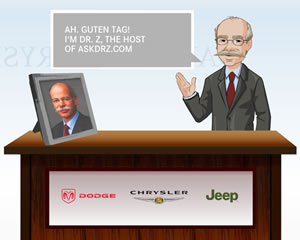 You’ve undoubtedly seen the "Dr. Z" TV commercials for Daimler-Chrysler, featuring company CEO Dr. Dieter Zetsche. Their research has told them they need to break from "The Big 2" – GM and Ford – by showcasing their differences – German engineering, association with Mercedes-Benz, etc.
You’ve undoubtedly seen the "Dr. Z" TV commercials for Daimler-Chrysler, featuring company CEO Dr. Dieter Zetsche. Their research has told them they need to break from "The Big 2" – GM and Ford – by showcasing their differences – German engineering, association with Mercedes-Benz, etc.
So, instead of "just the facts" ads or cars perched on majestic mountaintops, they’ve gone the "Spokesperson" route with Zetsche. We’ve seen this work with radio before because there’s always that personal opportunity for a station PD to create that one-to-one communication with the audience. It requires a commitment to the campaign, and the willingness to solve listener problems.
Back in the day, I used to host an "Ask The PD" show on a quarterly basis, taking calls from listeners about the station, music, and anything else on their minds. Instead of being daunting, these exercises are fun, educational, and they make an impression on the audience. If you can’t adequately address listener questions and concerns, you’re in the wrong business. And in most cases, the calls always run toward the positive side.
Why does "Spokesperson" work? It’s personal, it’s relatable, and if the PD (CEO) has some talent, it can create an audience connection that is memorable, and even meaningful. In Zetsche’s case, he’s a bit of a character, has a unique look, and these spots have already driven 400,000 visitors to AskDrZ.com.
That may not solve Daimler-Chrysler’s problems any more than it can make a damaged radio station healthy again. But as our communications with the companies we deal with become less personal, "Spokesperson" is always a viable option for stations willing to commit to talking with its audience AND responding to their needs.
- Media And Technology In 2025: Believe It Or Not! - April 18, 2025
- In Radio, You Just Never Know - April 17, 2025
- The Secret To Making A Great Podcast (And Great Radio) - April 16, 2025




Leave a Reply